Comcast 2014 Annual Report Download - page 25
Download and view the complete annual report
Please find page 25 of the 2014 Comcast annual report below. You can navigate through the pages in the report by either clicking on the pages listed below, or by using the keyword search tool below to find specific information within the annual report.-
 1
1 -
 2
2 -
 3
3 -
 4
4 -
 5
5 -
 6
6 -
 7
7 -
 8
8 -
 9
9 -
 10
10 -
 11
11 -
 12
12 -
 13
13 -
 14
14 -
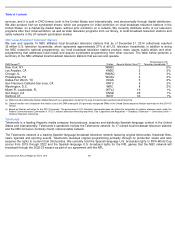 15
15 -
 16
16 -
 17
17 -
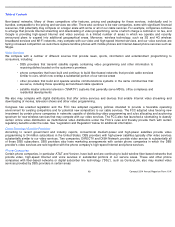 18
18 -
 19
19 -
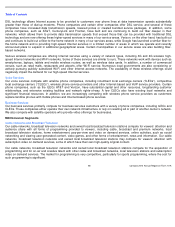 20
20 -
 21
21 -
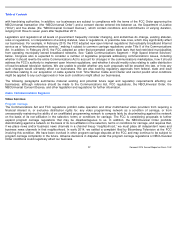 22
22 -
 23
23 -
 24
24 -
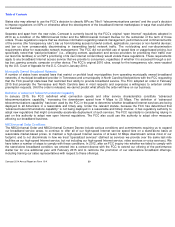 25
25 -
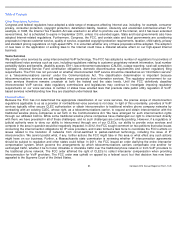 26
26 -
 27
27 -
 28
28 -
 29
29 -
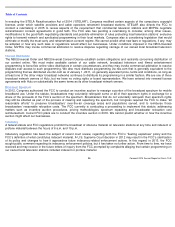 30
30 -
 31
31 -
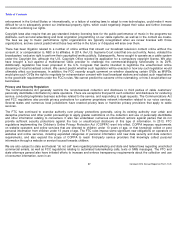 32
32 -
 33
33 -
 34
34 -
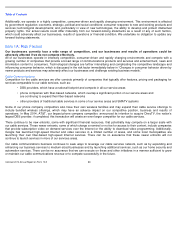 35
35 -
 36
36 -
 37
37 -
 38
38 -
 39
39 -
 40
40 -
 41
41 -
 42
42 -
 43
43 -
 44
44 -
 45
45 -
 46
46 -
 47
47 -
 48
48 -
 49
49 -
 50
50 -
 51
51 -
 52
52 -
 53
53 -
 54
54 -
 55
55 -
 56
56 -
 57
57 -
 58
58 -
 59
59 -
 60
60 -
 61
61 -
 62
62 -
 63
63 -
 64
64 -
 65
65 -
 66
66 -
 67
67 -
 68
68 -
 69
69 -
 70
70 -
 71
71 -
 72
72 -
 73
73 -
 74
74 -
 75
75 -
 76
76 -
 77
77 -
 78
78 -
 79
79 -
 80
80 -
 81
81 -
 82
82 -
 83
83 -
 84
84 -
 85
85 -
 86
86 -
 87
87 -
 88
88 -
 89
89 -
 90
90 -
 91
91 -
 92
92 -
 93
93 -
 94
94 -
 95
95 -
 96
96 -
 97
97 -
 98
98 -
 99
99 -
 100
100 -
 101
101 -
 102
102 -
 103
103 -
 104
104 -
 105
105 -
 106
106 -
 107
107 -
 108
108 -
 109
109 -
 110
110 -
 111
111 -
 112
112 -
 113
113 -
 114
114 -
 115
115 -
 116
116 -
 117
117 -
 118
118 -
 119
119 -
 120
120 -
 121
121 -
 122
122 -
 123
123 -
 124
124 -
 125
125 -
 126
126 -
 127
127 -
 128
128 -
 129
129 -
 130
130 -
 131
131 -
 132
132 -
 133
133 -
 134
134 -
 135
135 -
 136
136 -
 137
137 -
 138
138 -
 139
139 -
 140
140 -
 141
141 -
 142
142 -
 143
143 -
 144
144 -
 145
145 -
 146
146 -
 147
147 -
 148
148 -
 149
149 -
 150
150 -
 151
151 -
 152
152 -
 153
153 -
 154
154 -
 155
155 -
 156
156 -
 157
157 -
 158
158 -
 159
159 -
 160
160 -
 161
161 -
 162
162 -
 163
163 -
 164
164 -
 165
165 -
 166
166 -
 167
167 -
 168
168 -
 169
169 -
 170
170 -
 171
171 -
 172
172 -
 173
173 -
 174
174 -
 175
175 -
 176
176 -
 177
177 -
 178
178 -
 179
179 -
 180
180 -
 181
181 -
 182
182 -
 183
183 -
 184
184 -
 185
185 -
 186
186 -
 187
187 -
 188
188 -
 189
189 -
 190
190 -
 191
191 -
 192
192 -
 193
193 -
 194
194 -
 195
195 -
 196
196 -
 197
197 -
 198
198 -
 199
199 -
 200
200 -
 201
201 -
 202
202 -
 203
203 -
 204
204 -
 205
205 -
 206
206 -
 207
207 -
 208
208 -
 209
209 -
 210
210 -
 211
211 -
 212
212 -
 213
213 -
 214
214 -
 215
215 -
 216
216 -
 217
217 -
 218
218 -
 219
219 -
 220
220 -
 221
221 -
 222
222 -
 223
223 -
 224
224 -
 225
225 -
 226
226 -
 227
227 -
 228
228 -
 229
229 -
 230
230 -
 231
231 -
 232
232 -
 233
233 -
 234
234 -
 235
235 -
 236
236 -
 237
237 -
 238
238 -
 239
239 -
 240
240 -
 241
241 -
 242
242 -
 243
243 -
 244
244 -
 245
245 -
 246
246 -
 247
247 -
 248
248 -
 249
249 -
 250
250 -
 251
251 -
 252
252 -
 253
253 -
 254
254 -
 255
255 -
 256
256 -
 257
257 -
 258
258 -
 259
259 -
 260
260 -
 261
261 -
 262
262 -
 263
263 -
 264
264 -
 265
265 -
 266
266 -
 267
267 -
 268
268 -
 269
269 -
 270
270 -
 271
271 -
 272
272 -
 273
273 -
 274
274 -
 275
275 -
 276
276 -
 277
277 -
 278
278 -
 279
279 -
 280
280 -
 281
281 -
 282
282 -
 283
283 -
 284
284 -
 285
285 -
 286
286 -
 287
287 -
 288
288 -
 289
289 -
 290
290 -
 291
291 -
 292
292 -
 293
293 -
 294
294 -
 295
295 -
 296
296 -
 297
297 -
 298
298 -
 299
299 -
 300
300 -
 301
301 -
 302
302 -
 303
303 -
 304
304 -
 305
305 -
 306
306 -
 307
307 -
 308
308 -
 309
309 -
 310
310 -
 311
311 -
 312
312 -
 313
313 -
 314
314 -
 315
315 -
 316
316 -
 317
317 -
 318
318 -
 319
319 -
 320
320 -
 321
321 -
 322
322 -
 323
323 -
 324
324 -
 325
325 -
 326
326 -
 327
327 -
 328
328 -
 329
329 -
 330
330 -
 331
331 -
 332
332 -
 333
333 -
 334
334 -
 335
335 -
 336
336 -
 337
337 -
 338
338 -
 339
339 -
 340
340 -
 341
341 -
 342
342 -
 343
343 -
 344
344 -
 345
345 -
 346
346 -
 347
347 -
 348
348 -
 349
349 -
 350
350 -
 351
351 -
 352
352 -
 353
353 -
 354
354 -
 355
355 -
 356
356 -
 357
357 -
 358
358 -
 359
359 -
 360
360 -
 361
361 -
 362
362 -
 363
363 -
 364
364 -
 365
365 -
 366
366 -
 367
367 -
 368
368 -
 369
369 -
 370
370 -
 371
371 -
 372
372 -
 373
373 -
 374
374 -
 375
375 -
 376
376 -
 377
377 -
 378
378 -
 379
379 -
 380
380 -
 381
381 -
 382
382 -
 383
383 -
 384
384 -
 385
385 -
 386
386
 |
 |

Table of Contents
States also may attempt to use the FCC’s decision to classify ISPs as Title II “telecommunications carriers” and the court’
s decision
to impose regulations on ISPs or otherwise affect the development of the broadband Internet marketplace in ways that could affect
our business.
Separate and apart from the new rules, Comcast is currently bound by the FCC’s original “open Internet”
regulations adopted in
2010 as a condition of the NBCUniversal Order and the NBCUniversal Consent Decree for the remainder of the term of those
orders. These regulations require that we disclose information regarding network management, performance and commercial terms
of the service (the “transparency rule”); bar us from blocking access to lawful content, applications, services or non-
harmful devices;
and bar us from unreasonably discriminating in transmitting lawful network traffic. The no-blocking and non-
discrimination
requirements allow for reasonable network management. The FCC did not prohibit use of speed tiers or usage-
based pricing, but
specifically noted that “paid prioritization” (
i.e., charging content, application and service providers for prioritizing their traffic over
our last-mile facilities) or an ISP’
s prioritizing of its own Internet content likely would violate these regulations. These requirements
apply to any broadband Internet access service that we provide to consumers, regardless of whether it is accessed through a set-
top box, gaming console, computer or other device. The FCC’
s original 2010 rules, except for the transparency rule, were vacated
by the U.S. Court of Appeals for the D.C. Circuit in January 2014.
Municipally Owned Broadband Networks
A number of states have enacted laws that restrict or prohibit local municipalities from operating municipally owned broadband
networks. A municipal broadband provider in Tennessee and a municipality in North Carolina filed petitions with the FCC requesting
that the FCC preempt state laws that restricted their ability to provide broadband service. The FCC adopted an order in February
2015 that preempts the Tennessee and North Carolina laws in most respects and expresses a willingness to entertain similar
preemption requests. Until the order is released, we cannot predict what effects the order will have on our business.
Definition of Advanced Telecommunications Capability
In January 2015, the FCC redefined what connection speeds and other service characteristics constitute “
advanced
telecommunications capability,” increasing the downstream speed from 4 Mbps to 25 Mbps. The definition of “
advanced
telecommunications capability”
has been used by the FCC in the past to determine whether broadband Internet services are being
deployed to all Americans in a reasonable and timely way. Under the relevant statute, because the FCC has determined that
“advanced telecommunications capability”
is not being deployed in a reasonable and timely manner, it has regulatory authority to
adopt new regulations that might conceivably accelerate deployment of such services. The FCC reportedly is considering relying in
part on this authority to adopt new open Internet regulations. The FCC also could use this authority to adopt other measures
affecting our broadband business.
NBCUniversal Order Conditions
The NBCUniversal Order and NBCUniversal Consent Decree include various conditions and commitments requiring us to expand
our broadband service areas, to continue to offer all of our high-speed Internet service speed tiers on a stand-
alone basis at
reasonable market-based prices, to maintain a high-
speed Internet service of at least 12 Mbps downstream across most of our
footprint, and to not discriminate in how we treat “specialized services” (defined as services we provide over the same last-
mile
facilities as our high-speed Internet service, but not including our high-
speed Internet service, video services or voice services). We
have taken a number of steps to comply with these conditions. In 2012, after an FCC inquiry into whether we failed to comply with
the stand-
alone broadband condition, we entered into a consent decree with the FCC to extend our offering of the performance
starter tier for one additional year until February 2015 and to reinforce the promotion of our stand-
alone broadband offerings,
including training our sales representatives with respect to these offerings.
Comcast 2014 Annual Report on Form 10
-
K
20
